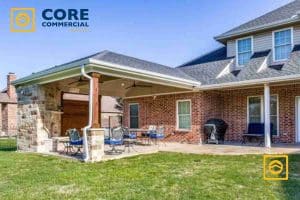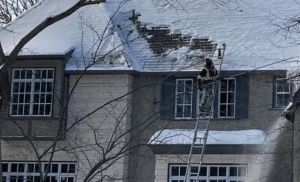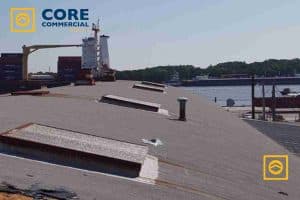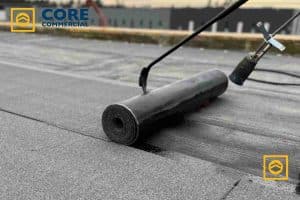Starting a commercial re-roofing project in Texas is a major investment, one that affects your building’s safety, performance, and long-term costs. But before you jump into contracts and construction, it’s crucial to ask the right questions. Texas weather, building codes, and roofing needs are unique, and failing to prepare properly can lead to expensive mistakes. This guide outlines the 10 most important questions you should ask before beginning a re-roof project on your commercial property. Each section is designed to help you make informed decisions, avoid common pitfalls, and ensure your roofing investment stands the test of time.
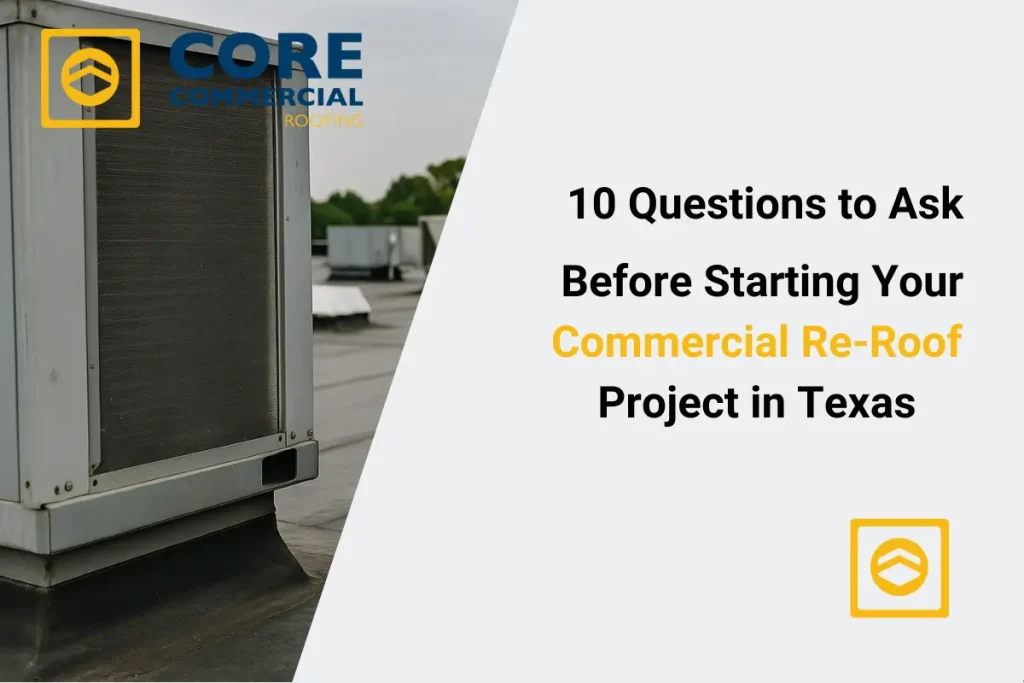
Table of Contents
1. What Problem Are You Trying to Solve With a Re-Roof?
Before doing anything, ask yourself: Why now?
- Is your roof leaking after storms?
- Have energy bills spiked?
- Is there visible damage, like bubbles, cracks, or sagging?
Understanding the “why” behind your decision helps you choose the right type of solution—whether that’s a full re-roof, partial repair, or applying a coating. Many Texas building owners jump straight to full replacement, but sometimes a more affordable fix may be available. Being clear on your problem helps you avoid overspending and ensures the final result fixes the issue.
User Benefit:
You avoid wasting money on unnecessary work and ensure the problem gets solved right the first time.
2. Is a Tear-Off or Overlay the Best Choice for Your Building?
Texas commercial buildings often qualify for an overlay instead of a full tear-off, but it’s not always the right move.
Overlay (Roofing over your current roof):
- Faster and cheaper
- Less disruption to business operations
- Adds extra weight to your structure
Tear-Off:
- Reveals hidden water damage or rot
- Complies with building codes in cases where overlays aren’t allowed
- Sets the stage for a longer-lasting roof
Tip:
Ask your roofing professional to perform a core sample and explain the condition of the current substrate. In some cities in Texas, like Austin or Houston, codes limit how many layers you can have—usually two.
User Benefit:
You get a roof that meets code, lasts longer, and won’t fail early because of underlying issues.
3. What Roofing Materials Are Best for Texas Weather?
Texas has intense sun, hurricane-force winds, hail, and sudden temperature drops. Not all materials handle this well.
Here are a few options commonly used in Texas:
- TPO (Thermoplastic Polyolefin): Reflects UV rays, energy-efficient, hail-resistant
- PVC (Polyvinyl Chloride): Great chemical resistance, durable in high-heat areas
- Modified Bitumen: Flexible and tough, ideal for flat roofs
- Metal Roofing: Long lifespan, but noisier and more expensive
Key Considerations:
- Is your roof flat or sloped?
- Do you need high reflectivity to reduce energy costs?
- Does your building handle chemicals or grease (restaurants, labs)?
User Benefit:
Choosing the right material ensures better performance and fewer repairs in extreme Texas weather.
4. Does Your Roofer Understand Local Building Codes and Permit Requirements?
Every city in Texas has different rules. For example:
- Houston requires wind uplift certification
- Dallas may require energy code compliance
- San Antonio enforces strict tear-off codes for older roofs
If your roofer isn’t up to speed on local codes, your project could face delays, fines, or be shut down completely.
Ask Your Contractor:
- Have you pulled permits in this city before?
- Are you familiar with the local inspection process?
- Do you have experience with city-specific requirements?
User Benefit:
You save time and money by avoiding permit problems and failed inspections.
5. Is the Roofing Company Properly Insured and Licensed in Texas?
This may seem obvious, but many commercial property owners skip this. If something goes wrong and the company isn’t properly insured, you could be liable for:
- Worker injuries
- Property damage
- Code violations
Verify:
- General liability insurance (minimum $1M policy)
- Workers’ compensation
- State or city license, if required (varies by jurisdiction)
Ask for proof—don’t just take their word for it.
User Benefit:
You protect yourself from legal headaches and unexpected costs.
6. What Warranties Are Offered and What Do They Cover?
Not all warranties are created equal. Many building owners assume a “20-year warranty” means peace of mind—but the fine print matters.
Types of Warranties:
- Manufacturer Warranty: Covers defects in materials
- Workmanship Warranty: Covers mistakes made during installation
- NDL (No Dollar Limit) Warranty: Best option; covers full replacement if the roof fails due to installation or product defects
Ask:
- Is it a prorated or full coverage warranty?
- Who handles claims—you or the contractor?
- What voids the warranty?
User Benefit:
You gain true protection for your investment, not just a piece of paper with empty promises.
7. How Will the Roofing Project Impact Your Business Operations?
Texas businesses can’t afford major downtime. Depending on your facility, a roofing project can interfere with:
- Customer access
- Sensitive equipment
- Temperature control
- Safety and security
Ask for a project schedule that includes:
- Working hours
- Noise levels
- Safety precautions
- Weather backup plans
Consider a night or weekend schedule if your business is especially sensitive to interruptions.
User Benefit:
Your business keeps running smoothly while the work gets done.
8. What Is the Real Cost—Not Just the Quote?
Quotes can be misleading if they don’t include hidden fees, such as:
- Tear-off and disposal charges
- Permit and inspection costs
- Equipment rental
- Weather delays
Also, watch out for change orders. Lowball quotes often lead to inflated final bills after “unexpected” issues come up.
Ask for:
- A detailed breakdown of costs
- Payment schedule
- How unexpected costs will be handled
User Benefit:
You stay within budget and avoid financial surprises halfway through the project.
9. What Experience Does the Contractor Have With Similar Commercial Projects in Texas?
Not all roofers are equal. A company might excel at small residential jobs but be completely unequipped for your 50,000-square-foot flat roof.
Ask for:
- Case studies or photos of similar projects
- References from commercial clients in your region
- A list of certifications (GAF, Firestone, Carlisle, etc.)
Ensure the contractor has experience handling buildings like yours, not just in terms of size, but also in terms of use (retail, medical, industrial).
User Benefit:
You reduce the risk of delays, subpar work, or total project failure.
10. What Is the Long-Term Maintenance Plan After Installation?
Even the best roof needs maintenance. In Texas, harsh sun and hailstorms mean you must stay proactive.
A good contractor will offer:
- Routine inspections (every 6 months or after major storms)
- Preventative maintenance plans
- Guidance on when to call for repairs vs. full replacement
Some even provide thermal imaging or drone inspections to detect hidden problems early.
User Benefit:
You extend the life of your roof and reduce repair costs over time.
Final Thoughts: Be a Prepared, Informed Building Owner
A commercial re-roof in Texas is more than just replacing some shingles or sheets. Steps to prevent roof leaks are a major investment in your property’s performance, safety, and value. Asking the right questions now saves you time, money, and headaches later.
To recap, make sure you understand:
- Why are you doing the project
- What type of roof and material makes sense
- How the contractor operates
- What protection and documentation do you receive
- How will the work affect your business
The more questions you ask at the start, the fewer unexpected issues you’ll run into later. With the right commercial roofing experts guiding you through each step, you not only avoid unnecessary costs, you gain confidence, clarity, and full control throughout the entire process.
FAQs
How much does a commercial re‑roof cost in Texas?
Costs vary depending on roof size, materials (like TPO, PVC, metal), tear‑off or overlay needs, disposal fees, local permits, and labor. A detailed quote should break down every cost so there are no surprises halfway through the project.
Should I tear off or overlay my Texas flat roof?
Overlaying is faster and cheaper, but adds weight and may hide deck damage. Tear‑off reveals hidden rot and ensures code compliance. Your roofer should inspect the substrate and check local codes (e.g., city layer limits) before advising the right option.
Which roofing material lasts longest in Texas heat?
TPO, PVC, and metal roofing handle UV rays, heat, hail, and heavy winds best. TPO reflects heat, PVC resists chemicals, and metal is durable but louder. Choosing the right one affects roof life, energy savings, and storm resistance.
Do I need a permit for a commercial re‑roof in Houston?
What warranty should I get on a Texas commercial roof?
Ask for both manufacturer and workmanship warranties. The best option is an NDL (No Dollar Limit) warranty—it covers full repair/replacement for material or installation failures, giving real protection rather than limited coverage.
Can my business stay open during a re‑roof in Dallas?
Yes—if planned properly. Ask your roofer for a schedule, noise plan, safety steps, and weather backup. They should offer options like phased work, night/weekend shifts, and safe access to avoid disrupting customers or operations.
How do I check if my roofer is licensed and insured in Texas?
Always ask for proof of general liability (typically $1M+) and workers’ comp insurance. If working in a city with licensing, check their TX roofing contractor license. Don’t accept verbal claims—ask for documents.
What questions should I ask about commercial roofing in Texas?
Key questions include: Why are we re‑roofing? Overlay or tear‑off? Best materials? Local code experience? Warranty coverage? Timeline and disruption? Total cost breakdown? Maintenance plan post‑installation?
How long will my Texas commercial roof last?
Lifespans depend on material, climate, installation, and upkeep. TPO/PVC roofs last 20–30 years; metal roofs last 40+ years if installed correctly. Regular inspections and preventive maintenance can extend the life considerably.
What’s included in commercial roof maintenance plans?
A good plan includes semi‑annual or post‑storm inspections, debris cleaning, checking flashing and seals, early repair of blisters or cracks, and periodic thermal/drone inspections to catch issues before leaks begin.



